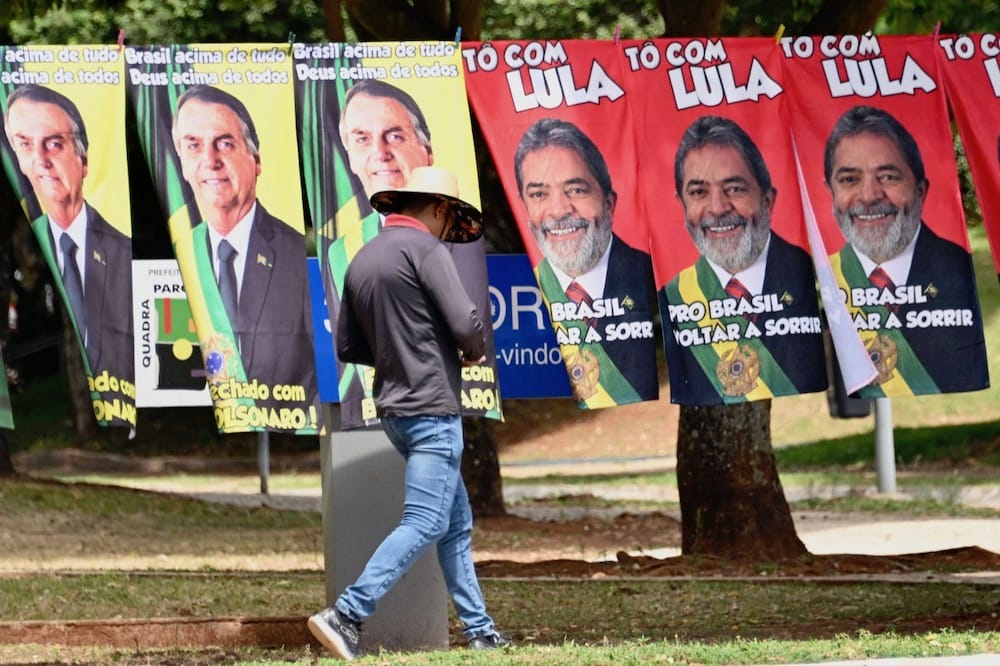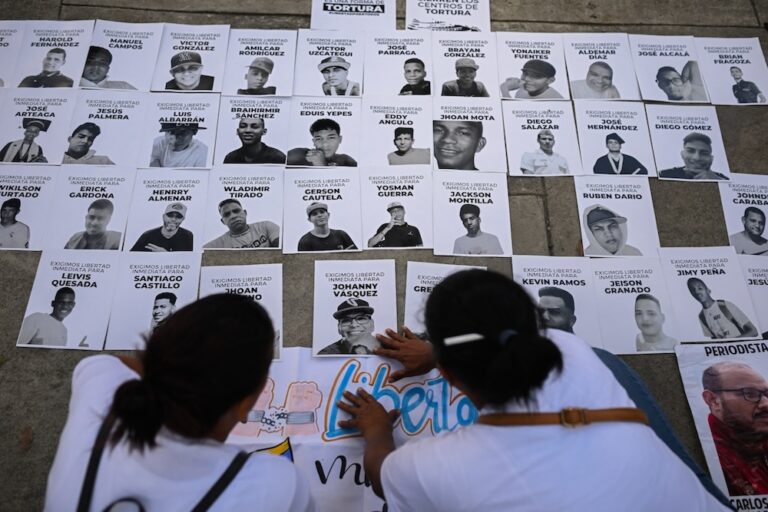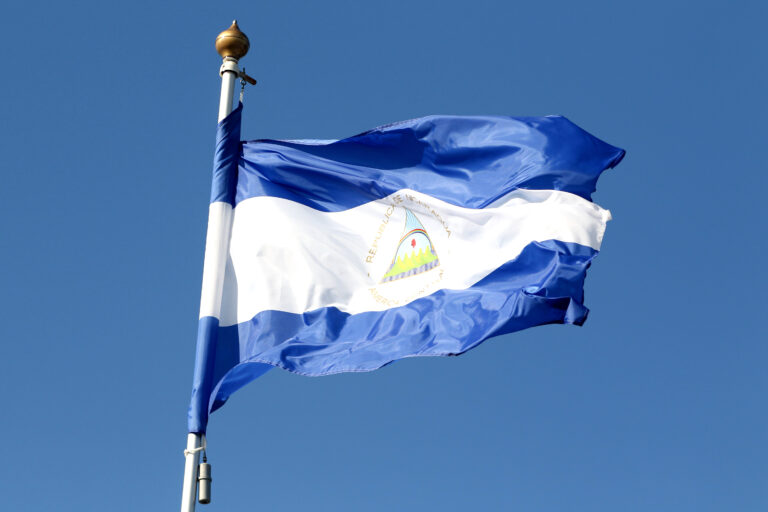September 2022 in the Americas: A free expression round up produced by IFEX's Regional Editor Laura Vidal, based on IFEX member reports and news from the region.
Brazil’s election season heightens tensions and complicates people’s access to information and the work of the press. The killing of a journalist in Paraguay takes place amidst a tightened grip by criminal groups on certain regions. Cuba pushes harder against independent journalists, while violence in Haiti continues to take journalists’ lives. Meanwhile, in Canada, women journalists, especially those with minority backgrounds, are violently targeted online.
Brazil: Misinformation, disinformation and attacks against journalists make for a rocky road to the election
As Brazil’s presidential elections approach, tensions are growing, keeping the whole of the region on the edge of its seat. Violence continues to rise, attacks against journalists are widespread, and the expanding issue of targeted disinformation further complicates the context.
The use of disinformation is far from recent, but technology is opening up new options that are difficult to counter. In the latest edition of Artigo19’s Magazine, Paulo José Lara warns of an anticipated increase in the use of deepfakes, (videos of people whose face or body have been digitally altered so that they appear to be someone else) coordinated by groups on WhatsApp and YouTube. There is also the possibility that some of these groups will have access to spying malware, given their connections to government officials.
As a response, the Superior Electoral Court has formed some alliances with platforms (albeit with significant limitations), with civil society organisations, and with fact-checking agencies to ensure clarity regarding the voting system. A series of short videos made by Artigo19, for example, tackle important rumours in an easy-to-share and friendly format.
Disinformation is far from the only threat Brazil is facing in this election season. Journalists have been the target of numerous attacks. Some of the most visible cases in September were those of Vera Magalhães, who received death and rape threats, and Yago Sales, who reported suspicions of phone hacking and the presence of menacing vehicles close to his home. Brazilian journalists covering Elizabeth II’s State funeral in London were targeted by Bolsonaro supporters in London.
A formal and public statement signed by 10 organisations (including IFEX’s members Abraji, Artigo19 and Reporters Without Borders) demanded that the work of journalists be respected. The Office of the United Nations High Commissioner for Human Rights also published a statement urging authorities to ensure that the elections take place in peaceful conditions, and expressing concern for the online and offline threats and attacks that have been targeting women, afro-descendent, indigenous and LGBTQI+ candidates.
Paraguay: Strengthening of organised crime
The killing of journalist Humberto Coronel in early September was a harsh reminder of why Pedro Juan Caballero, a city close to the Brazilian border, is considered the most dangerous in the country. Coronel worked as the host of a daily news and music program on Radio Amambay, in which he sometimes denounced political corruption, as well as the incapacity of law enforcement to solve crimes.
In 2016 and 2021 Paraguay received several recommendations in its Universal Periodic Review (following intense campaigning from the IFEX-ALC alliance and local member, the Sindicato de Periodistas del Paraguay, SPP) which encouraged, among other measures, the creation of a special commission to investigate crimes against journalists. The violence, however, continues to intensify and crimes committed against journalists remain unpunished. Coronel’s assassination is seen as proof of the lack of commitment and concrete action from the state to ensure journalists’ safety, particularly along the border with Brazil, where organized crime and drug trafficking seem to be tightening their grip.
In a joint statement, IFEX member SPP and local human rights organisation CODEHUPY highlighted that violence continues, and impunity remains dominant. Coronel is the 8th journalist to have been killed in Paraguay since the well-known case of journalist and human rights defender Santiago Leguizamón, a case that, due to Paraguay’s lack of due diligence, is currently under review by the IACHR.. If organised crime continues to expand to other regions within Paraguay and more journalists are threatened and left unprotected, Coronel’s killing may be a chilling glimpse into Paraguay’s future.
Canada: Online harassment aimed at silencing women journalists
While Canada doesn’t appear very often in our reports on threats to media, the mounting violence taking place against women journalists online – especially those from racialized backgrounds – has prompted 48 media organizations (among them PEN Canada) to send an open letter to Prime Minister Justin Trudeau urging both government and authorities to take action against the “increasing and alarming online hate and harassment targeting journalists and journalism as a profession”.
The attacks have increased in frequency, but they are not new. An important antecedent is what took place during the covering of vaccine mandate protests and the COVID-19 pandemic itself. Earlier this year PEN Canada had already begun sounding alarms. Research by IPSOS in 2021 based on interviews with 1,000 journalists found that harassment was worse against women, racialized women, and LGBTQI+ journalists (some of whom have identities that intersect all categories).
The discourse echoes that of far-right groups and populist leaders who, according to sociologist Rachel Kleinfeld, aim to have a press-free relationship with people and dictate what reality is. They want to suppress reporting on vulnerable groups, and force journalists from marginalized communities back into silence.
With the rise of attacks, some journalists who had to flee their home countries and found refuge in Canada (some of whom have helped local media survive) are back to living under threat.
Cuba: Doubling down on attacks against the independent press
September saw the worrying publication of Cuba’s new Penal Code and new cases of pressure and harassment against independent journalists. IFEX member ARTICLE 19 says the new code makes Cubans even more defenceless, and that it can be used to further suppress dissent and the work of journalists. The organisation also published a report analysing the last six months in Cuba, counting 125 cases of attacks against journalists that included house arrests, subpoenas, internet service suspensions, and arbitrary detentions.
During late August and early September numerous independent journalists were forced to resign following direct or indirect pressure from the authorities. Most of them had to communicate their decision publicly, often declaring they would not work for any kind of media that is not connected directly to the State. According to ARTICLE 19, some journalists had to record themselves on video expressing regret for their work for a particular outlet, and to sign a letter stating they will never work for “counter-revolutionary organisations”.
Ismario Rodríguez Pérez, for example, from Periodismo de Barrio, went public about the threats he received. He was told he could be put in prison “just like [Cuban artists] Luis Manuel Otero, Maykel Osorbo” who have been sentenced to nine and five years of prison, respectively. Some media outlets were forced to stop operating altogether when their directors or other important collaborators were forced to resign, as in the case of Wimar Verdecia and its graphic outlet Xel2, or Jancel Moreno, a contributor to ADN Cuba, who had to close down a Facebook page in favour of LGBTQI+ rights page that he administered.
Haiti: Media caught up in the violence
As violence continues to dominate in Haiti, a political and social crisis deepens the humanitarian one, and leaves journalists and press workers without the necessary protections to do their work. As IAPA’s chairman, Carlos Jornet stated: “Haitian journalism is under serious threat this year, marked by murders, intimidation, kidnappings, and attacks on the media.”
Journalists Frantzsen Charles of FS News and Tayson Lartigue of Tijèn Jounalis were killed on 11 September, while covering clashes between rival gangs in Cité Soleil, in the Haitian capital, Port au Prince. Earlier this year, the Haitian journalism community grieved the deaths of John Wesley Amady, Wilguens Louissaint and Maxihen Lazarre, all killed in the course of their work.
On 13 September, Radio Model FM suffered an attack that ended in considerable damage to the station and the wounding of a station technician. Other violent incidents have included journalists being hit by rubber bullets or attacked by police officers.
In brief
Venezuela: Nine radio stations were closed by the National Commission of Telecommunications (Conatel). According to an employee of the station, a representative from Conatel said they had “orders from the Minister,” without giving much detail. With these, the number of radio stations closed down in 2022 with little to no clear justification or information rises to 20.
Honduras: C-Libre produced the report From repression in the public space to digital silencing. It presents an analysis of what’s been affecting the information and communication environment in Honduras over the last 18 months, including threats from both the government and criminal groups.
Nicaragua: CNN en Español was blocked. In “another grotesque example of censorship and persecution,” according to IFEX member the Inter American Press Association, the Ortega-Murillo government cancelled the CNN en Español signal on 21 September. CNN announced that it would continue the service through its portal and YouTube channel.



